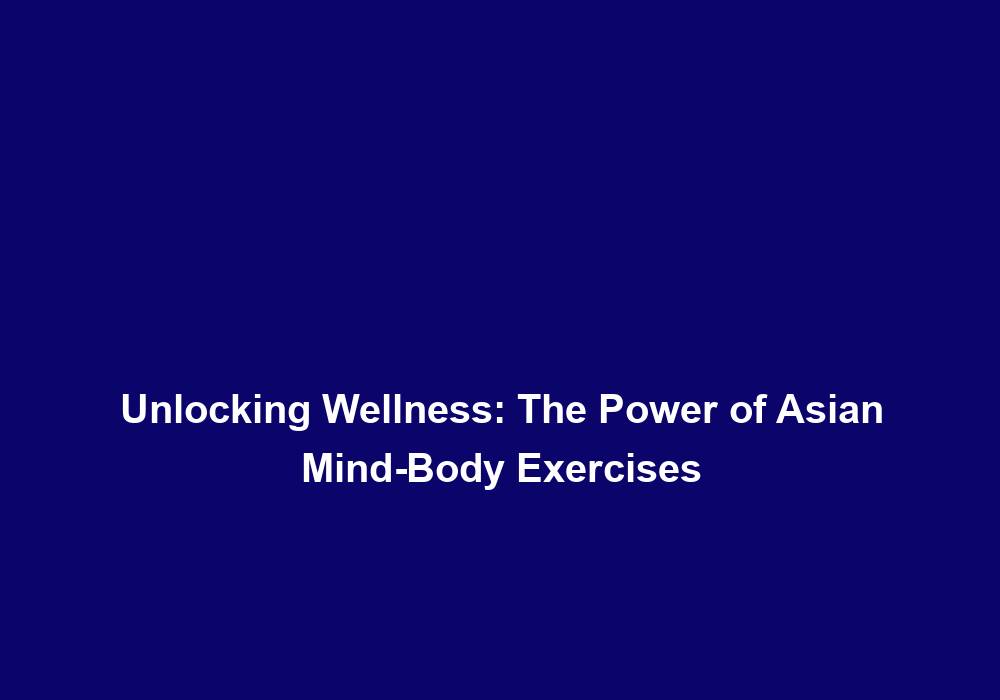Unlocking Wellness: The Power of Asian Mind-Body Exercises
In today’s fast-paced and stressful world, achieving and maintaining overall wellness has become an essential aspect of our lives. While there are various ways to promote physical and mental well-being, one powerful approach that has gained significant popularity is Asian mind-body exercises. These exercises encompass a wide range of practices originating from ancient Asian cultures, such as Yoga, Tai Chi, Qigong, and Meditation. Let’s delve into the profound benefits and significance of these exercises in unlocking wellness.
The Historical Roots and Cultural Significance
Asian mind-body exercises have deep roots in ancient cultures, dating back thousands of years. They are not merely physical exercises; rather, they encompass a holistic approach to well-being, incorporating physical movement, breath control, mindfulness, and spiritual elements. These practices were traditionally used to promote health, longevity, and spiritual growth.
- Physical movement: These exercises involve gentle and controlled movements that promote flexibility, strength, and balance.
- Breath control: Deep breathing techniques are emphasized, helping to enhance relaxation and overall well-being.
- Mindfulness: Asian mind-body exercises encourage focused awareness on the present moment, fostering self-awareness and self-acceptance.
- Spiritual elements: Many of these exercises offer a pathway to explore and nurture one’s spiritual side, connecting with something greater than oneself.
The Physical Benefits
- Improved Flexibility and Strength: Asian mind-body exercises, such as Yoga and Tai Chi, involve gentle stretching movements that improve flexibility, enhance joint mobility, and increase muscle strength. Regular practice helps to maintain a full range of motion and prevent injuries.
- Enhanced Balance and Coordination: The slow and controlled movements performed in these exercises help improve balance, coordination, and body awareness, reducing the risk of falls and improving overall stability. This is particularly beneficial for older adults and those with balance issues.
- Cardiovascular Health: Certain forms of Asian mind-body exercises, like Tai Chi and Qigong, incorporate flowing movements that can elevate heart rate and improve cardiovascular fitness. These exercises provide a low-impact way to increase heart rate and promote a healthy cardiovascular system.
- Increased Energy Levels: Regular practice of these exercises can boost energy levels, combat fatigue, and promote overall vitality. The combination of physical movement, deep breathing, and mindfulness helps to invigorate the body and mind.
The Mental and Emotional Benefits
- Stress Relief: Asian mind-body exercises emphasize deep breathing, relaxation, and mindfulness, providing effective tools to manage stress, anxiety, and promote mental well-being. These exercises create a sense of calm and help individuals cope with the pressures of daily life.
- Improved Cognitive Function: Research suggests that these exercises may enhance cognitive abilities, such as attention, memory, and concentration, contributing to better mental clarity and overall brain health. The combination of physical movement, breath control, and mindfulness helps to improve focus and cognitive function.
- Emotional Balance: The combination of physical movement, breath control, and mindfulness in these exercises helps regulate emotions, reduce symptoms of depression, and promote emotional balance. By connecting the mind and body, individuals can experience a greater sense of emotional well-being.
- Enhanced Sleep Quality: The relaxation techniques incorporated in Asian mind-body exercises can improve sleep quality, alleviate insomnia, and promote a more restful state. These exercises help individuals relax both physically and mentally, creating an optimal environment for quality sleep.
The Spiritual and Mindful Aspect
- Cultivating Mindfulness: Mindfulness is a key component of Asian mind-body exercises. Through focused awareness on the present moment, practitioners can develop a deeper connection with their bodies, thoughts, and emotions, fostering self-awareness and self-acceptance. Mindfulness helps individuals become more attuned to their inner selves and promotes a sense of overall well-being.
- Deepening Spiritual Connection: Many Asian mind-body exercises, such as Yoga and Meditation, offer a pathway to explore and nurture one’s spiritual side, connecting with something greater than oneself. These exercises provide individuals with the opportunity to delve into their spirituality and find a sense of purpose and meaning.
- Promoting Inner Peace: The practice of these exercises creates a space for inner reflection, calming the mind, and promoting a sense of inner peace and tranquility. By focusing on the present moment and letting go of external distractions, individuals can find solace and peace within themselves.
Getting Started with Asian Mind-Body Exercises
- Choosing the Right Practice: Explore different Asian mind-body exercises, such as Yoga, Tai Chi, Qigong, and Meditation, to find the practice that resonates with you the most. Each practice offers unique benefits, so it’s important to find the one that aligns with your goals and preferences.
- Seeking Qualified Instruction: It is highly recommended to seek guidance from qualified instructors or practitioners who can teach you the proper techniques and ensure a safe and effective practice. They can provide personalized instruction, correct your form, and offer guidance throughout your journey.
- Starting Slow and Gradual: Begin with beginner-friendly classes or instructional videos that cater to your fitness and experience level. It is essential to listen to your body and progress at your own pace. Starting slowly helps to prevent injuries and build a strong foundation for future growth.
- Consistency and Regular Practice: Dedicate regular time to practice Asian mind-body exercises. Consistency is key to experiencing the full range of benefits these exercises offer. Aim for a balanced routine that includes both physical and mindful components.
- Creating a Mindful Environment: Find a quiet, peaceful space to practice, free from distractions. Consider incorporating calming music, candles, or natural elements to enhance the atmosphere. Creating a serene environment helps to set the mood and deepen your practice.
- Integrating into Daily Routine: Incorporate these exercises into your daily routine, even if it’s just a few minutes of practice each day. Consistent practice will yield more significant long-term benefits. Find a time that works best for you, whether it’s in the morning to start your day off right or in the evening to unwind and relax.
Conclusion
Asian mind-body exercises have a remarkable ability to unlock wellness, promoting physical health, mental well-being, and spiritual growth. Incorporating practices like Yoga, Tai Chi, Qigong, and Meditation into our lives can help us find balance, reduce stress, enhance cognitive function, and cultivate a sense of inner peace. By embracing these ancient Asian traditions, we can embark on a transformative journey towards holistic wellness.







